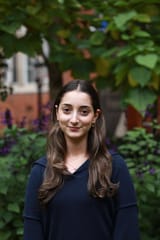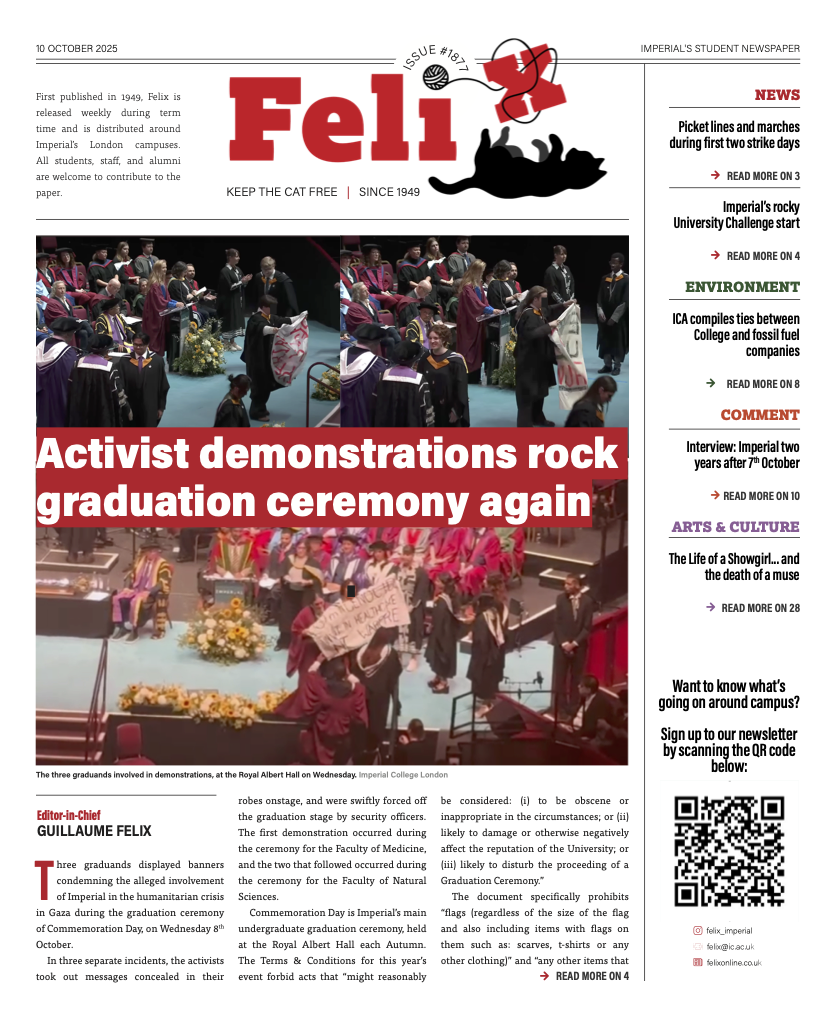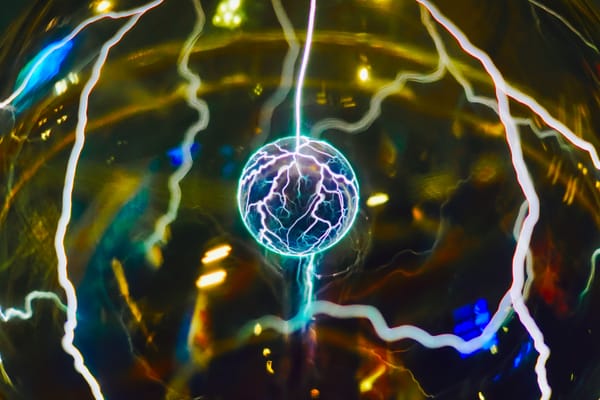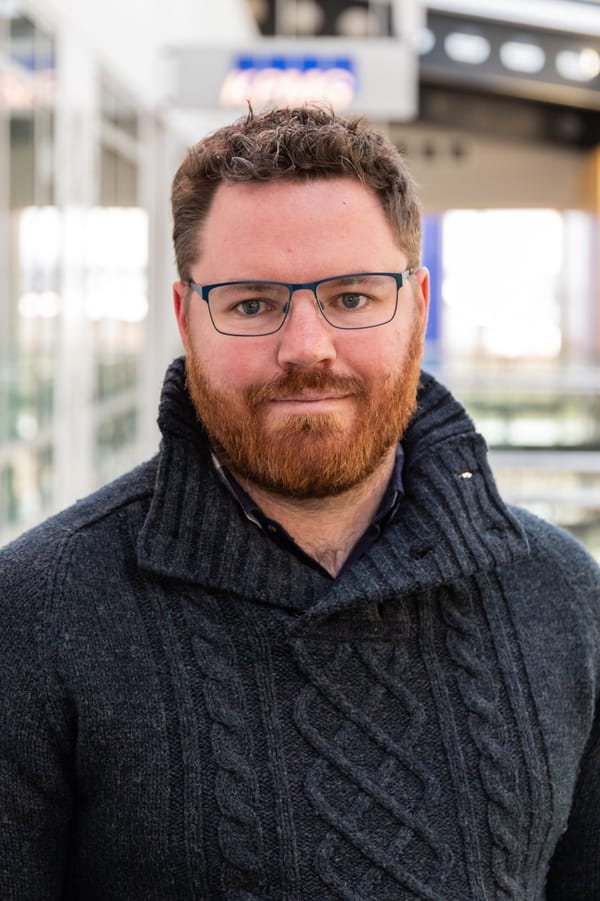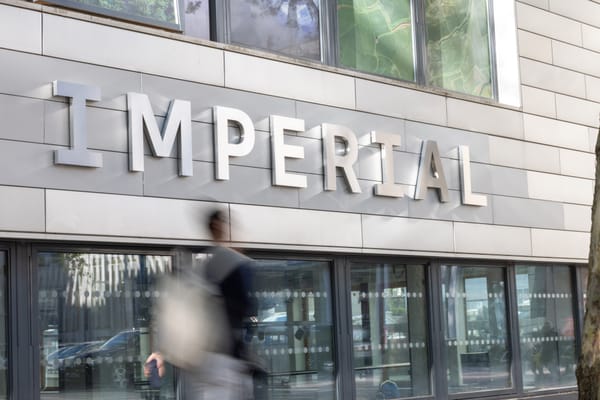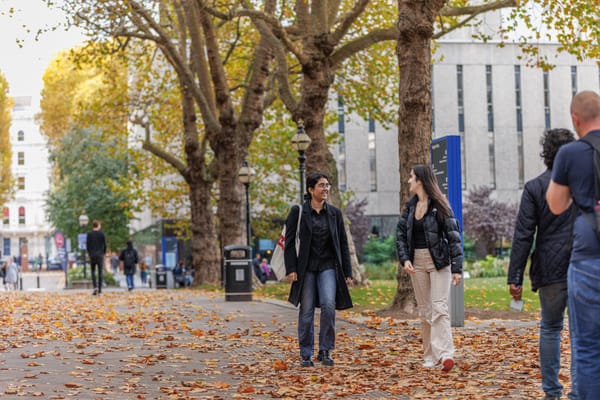Imperial, Two Years After October 7
The Israeli and Palestinian societies at Imperial reflect on their experiences over the past two years.
On 7th October 2023, Hamas launched a surprise attack on southern Israel, killing around 1,200 people and taking more than 200 hostages. Israel responded with a military campaign in Gaza that has since killed over 60,000 Palestinians, displaced much of the population, and created a humanitarian crisis that the International Association of Genocide Scholars (IAGS) defines as a genocide.
Israeli and Hamas negotiators were set to meet in Cairo this week to discuss the first steps of President Trump’s 20-point plan to end the war, two years after it began.
The reverberations of these events are still, however, felt far from the region itself. At Imperial, the war has shaped student life in profound ways: sparking protests and encampments, raising questions about the College’s stance, and leaving many struggling to balance academic life with their sense of safety. To understand how the campus community has navigated through these years, I spoke with members of Imperial’s Palestinian and Israeli societies.
The Societies
Over the past two years, Friends of Palestine (FoP) has been a vocal critic of Imperial’s financial and research ties to companies implicated in the war. To understand how this activism has shaped their society and student life, I spoke with two of its members: Hibbeh, the society’s vice president, and a fellow member who asked to be identified under the pseudonym John.
The Israeli Society (IS), by contrast, has attempted to maintain its focus on celebrating Israel’s culture, technology, and innovation. To understand how this may have become harder, I spoke with Aaron, now in his third year as the society’s president, and Benjamin, a newer member serving as secretary.
The interview
Q: How have you been personally affected or impacted over these past two years?
FoP: Both FoP members circled back to a shared sense of responsibility. John, originally from Pakistan, told me he was struck by “the sheer scale of horror” he saw on the news, compounded by the silence he perceived from the university. That, he said, compelled him to join the society: “Students have a responsibility to change an institution when it has done wrong.”
Hibbeh was more reluctant to frame themselves as directly affected, emphasising what they called the “privilege” of their own position. Yet they added that “it is hard to say any human being has not been affected by what is happening in Gaza.” For them, the real moral difficulty was “holding those two things at once – being a student at Imperial while it remains complicit in the war.”
IS: Aaron described October 7 as a moment that transformed both his personal life and his presidency. With family and friends directly affected, he said it had been an “impactful and worrying time”.
Ben explained that he joined the society to find a community that would understand the anxieties he carried with him to campus. “I wanted to find a place where people might feel things similar to me,” he said. Both noted that ordinary interactions had become more fraught, with conversations often touching on politics or safety, making the society a vital source of support.
Q: How has your experience as a student at Imperial changed since October 7? What have been the major challenges?
FoP: Both Hibbeh and John described that their priorities as students had shifted, particularly in their relationship with the university. Hibbeh called Gaza “the moral compass of society,” explaining that watching events unfold on their phone made them more alert to the systems underpinning student life on campus.
For them, the war seeped into daily experiences, sharpening their political awareness and distressing them emotionally. John echoed this sense of disillusionment, saying that “seeing the lack of action at Imperial is disheartening. You want to be at a university that encourages learning.”
IS: For Aaron, the challenge lay in the way October 7 reframed everyday interactions. He found himself looked to as a representative voice, often being asked to explain events rather than simply being treated as a student. Ben described the quieter strain felt behind the scenes, where students undergo experiences that leave them feeling unsafe. Both agreed that the past two years had made university life more emotionally demanding, but also said the Israeli society had become a crucial space of solidarity.
Q: How have you perceived the atmosphere on campus since?
FoP: Asked about the campus climate, both Hibbeh and John described a contrast between student solidarity and institutional hostility. Hibbeh spoke of “an overwhelming amount
of support” from fellow students and staff, which emboldened them to walk openly around campus in a keffiyeh, a traditional Palestinian headdress that has become a wider symbol of solidarity.
Concurrently, they pointed to institutional pushback, citing “baseless disciplinaries, fear-mongering, and incidents where staff or security targeted students advocating for Palestine”. John recalled one
incident during last year’s Exhibition Road Festival when security guards, he said, were radioed to stop the group specifically and ask for ID upon entry to the Union bar (a publicly accessible space). “That was profiling, and it was jarring,” he added.
IS: Aaron and Ben both stressed that Imperial has been, in their eyes, “a relatively safe space,” particularly compared with other London universities such as UCL or King’s. Still, they acknowledged moments of unease. Ben admitted that he sometimes hesitated to say he visits Israel, wary of the associations it might carry, or to mention he spoke Hebrew, remembering one occasion when a peer responded: “I can’t be friends with murderers.” For him, this was a painful example of how politics could fracture ordinary friendships, severing something that might have otherwise blossomed naturally.
Yet both stressed that, overall, Imperial’s climate had been less hostile than elsewhere, and they praised the college’s support structures – from chaplaincy to security – as responsive when issues were raised.
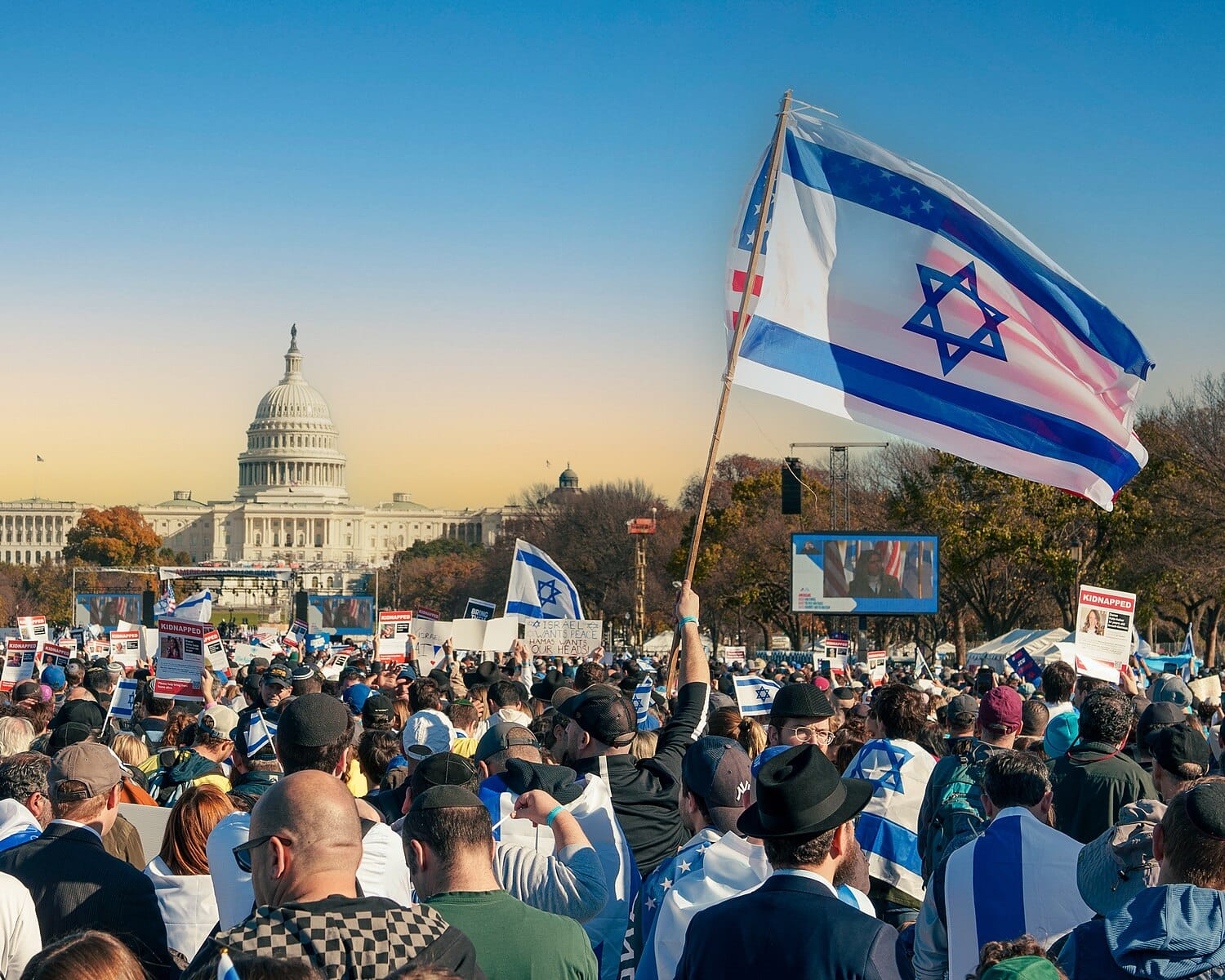
Q: What is your society’s role in response to this period? Do you provide support, advocacy, or awareness?
FoP: Over the past two years, FoP’s role has been to straddle both political activism and cultural engagement. John explained that some of the society’s pressing aims have been to “expose the university’s complicity through divestment reports, highlighting research partners involved in Israel’s war crimes, and mobilising students”.
Alongside this, they have sought to showcase Palestinian culture through film screenings of Gaza-made productions, poetry evenings, and cultural collaborations with other societies. Hibbeh emphasised the importance of keeping political engagement alive on campus, arguing that “Imperial has an unfair stereotype that nobody cares about politics. That’s not true. There is an energy here.”
IS: The Israeli Society’s purpose has always been cultural, not political. Aaron explained that the goal “has been to give a window into Israel as a start-up nation, introducing its tech, culture, and entrepreneurship.” However, after October 7, they have had to adapt. He explained, “My role has shifted into advocacy and, in some ways, counselling. Members turn to me when they feel uncomfortable or unsafe.” Ben noted how the membership itself has changed. Once diverse with many non-Israeli and non-Jewish members, it has since contracted to a smaller, more homogenous core.
Q: How do you feel Imperial has responded to students impacted by this war and to societies like yours?
FoP: When the conversation turned to Imperial itself, Hibbeh and John expressed frustration with the institution’s inadequate action. John dismissed official statements of concern as hollow, explaining that “if the university were truly concerned, it would divest”. Hibbeh pointed to the college’s slowness in offering even minimal concessions, such as scholarships for Palestinian students, which “only came after the society presented management with research on that specific scholarship”.
Hibbeh continued by saying that every milestone is watered down, explaining that even their own ten-day hunger strike only conceded to a meeting with Imperial’s Chief Investment Officer, “who claimed the university had to make these complicit investments for profit”.
IP: Where FoP expressed anger, the Israeli Society spoke of a more positive interaction with the administration. Aaron described good communication with Imperial’s leadership, pointing to regular meetings with the leadership and access to services and resources, such as counselling and casework teams, that were not just “names on a website” but tangible sources of support. “Given how unprecedented October 7 was, I think the college has been good,” Aaron reflected. For them, the responsiveness of these structures provided a sense of reassurance, even if broader political debates on campus remained daunting.
Q: Looking back, what moments or turning points stand out to you from the past two years?
FoP: Despite exhaustion, both members of FoP said they took pride in what had been achieved, from the encampment they maintained to the scholarships put in place and the mobilisation of hundreds of students. Yet they also explained that their victories are incomplete and their accomplishments are tempered. “Every win is tinged by the knowledge that the genocide goes on,” Hibbeh said. “Everything we do is what we should be doing. But it is not enough.”
IS: Looking back, Aaron and Ben highlighted moments that unsettled their community. During June 2024, the campus encampment left many Jewish and Israeli students feeling uneasy, along with a performance during the Summer Ball, when a performer on stage led chants against Israel. These incidents, they said, created an atmosphere of fear. With that, Aaron insisted that their greatest achievement was continuity itself: “The fact that we kept going, didn’t give up, and kept hosting events – that is something to be proud of.”
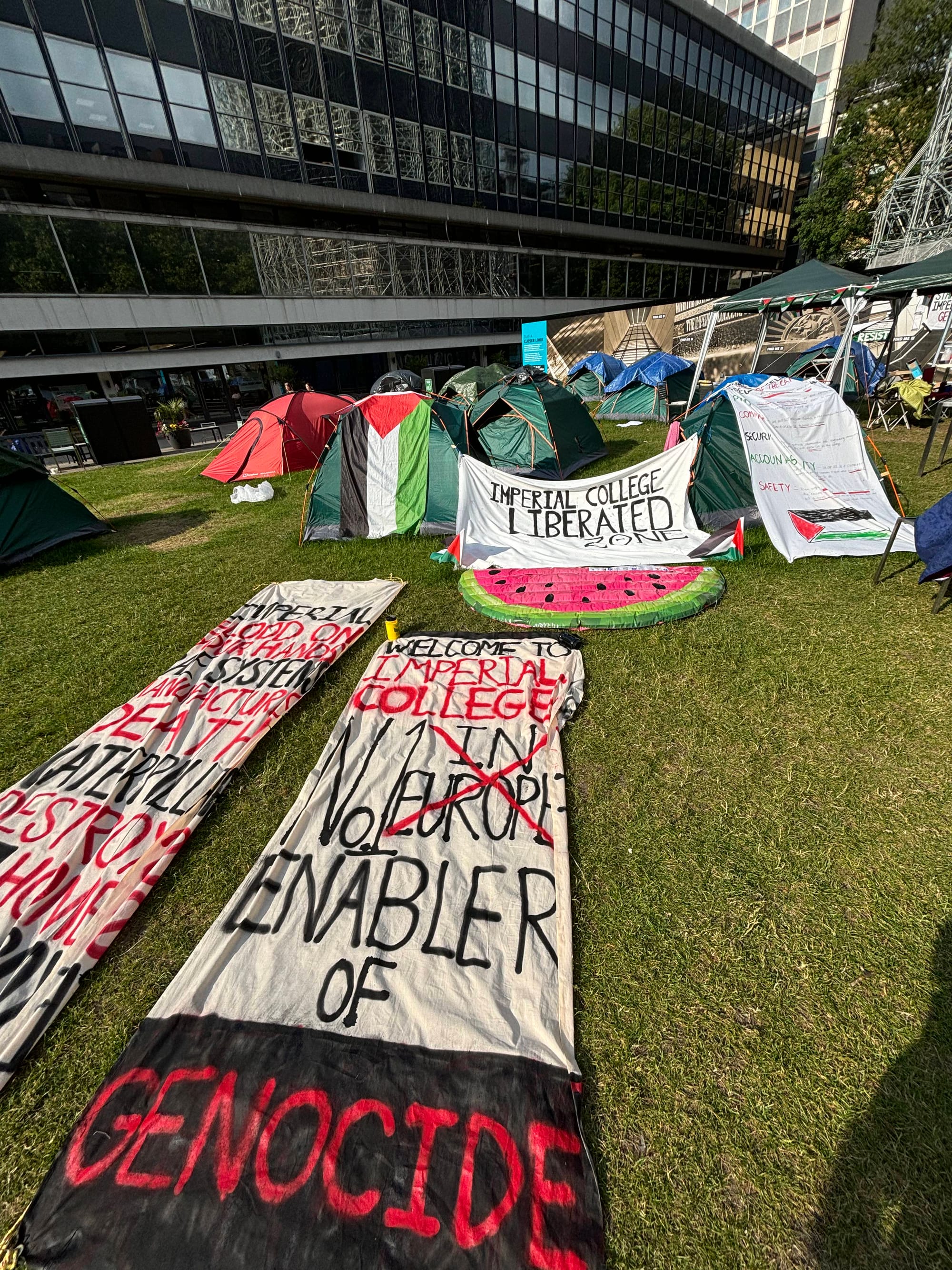
Q: What message would you like to share with the wider Imperial community?
FoP: John urges his peers to trust their instincts and recognise their own role in shaping the university: “Keep your eyes open. This is wrong, and we bear responsibility. Student activism has made a difference before, and it can again.” Hibbeh added a historical reminder that “nothing began on October 7. The Palestinian struggle stretches back to 1948 and before, to the Nakba and the British Mandate. It will continue until liberation is achieved. Please come speak to us. Ask questions.”
IS: Aaron advises his fellow students to break the echo chambers and emphasises the importance of dialogue across differences: “Go to each other’s events peacefully, listen, learn. Do your research, speak to people even when it’s uncomfortable.” Ben added that “if you know someone Jewish or Israeli, have a conversation about it and let them express themselves freely because it can be a bit lonely at times.”
Beyond these narratives
What do these testimonies tell us, two years on? Perhaps the war in Gaza is not only fought in headlines and casualty figures, but also in the daily rhythms of student life. That solidarity can coexist with profiling, and loneliness can persist even in a crowded campus. And that, for better or worse, Imperial students will continue to live in realities side by side, divided by politics but united in the belief that silence is not an option.

